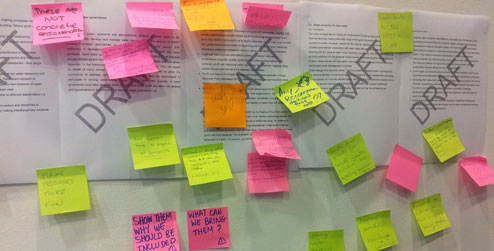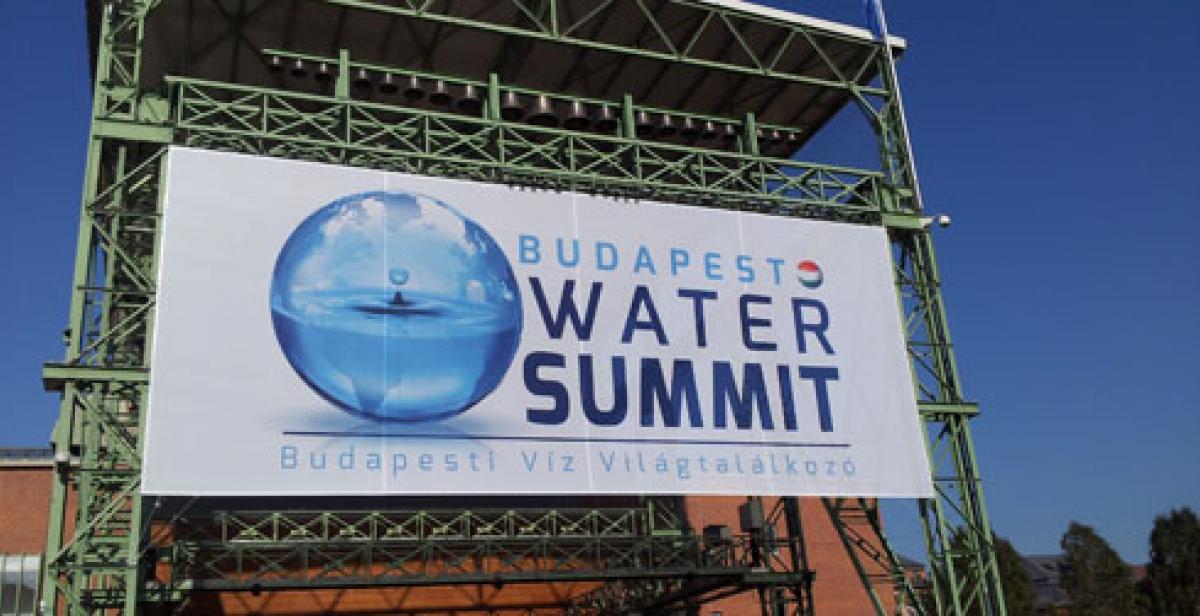Progressio’s Environment Policy Officer Lis Wallace writes from Budapest:
Over four days in Budapest, representatives from an assortment of governments, international organisations, financial institutions, businesses as well as civil society and science have been discussing the most pressing challenges related to water and sanitation.
Water and the SDGs
The significance of the Hungarian government hosting the event is that Hungary, along with Kenya, is currently co-chairing the Open Working Group on Sustainable Development Goals. This group, which includes the governments of the UK and Ireland, is the product of agreement at Rio+20 to develop a set of universal SDGs, and is tasked with developing concrete proposals on the SDGs.
The aim of the Budapest Water Summit has been to take stock of the developments, within and outside the UN system, in preparing for water and sanitation related goals in the post-2015 development agenda. Read more on the SDGs and Progressio's work to date.
Stakeholder forums
In addition to the usual plenaries, discussing topics such as how to achieve universal access to water and sanitation, and good water governance, the Budapest Water Summit has had four stakeholder forums: science, youth, business and civil society. Alongside the Budapest Water Summit Statement, each of the forums has produced a written statement synthesising the discussions, concerns, priorities and recommendations of its stakeholders.

By all accounts the Youth Forum has been the most participative, energetic and enthusiastic – as well as the only forum to feature sticky notes. It seems only fitting given that the strap line of the conference, 'Give the future a chance', that young people who will be the generation dealing with the consequences of water scarcity and degradation unless immediate action is taken, be given a voice in these discussions.
Fortunately given the age bracket of 18-35 years old, I count as youth, and thus, whilst Progressio's messages haven't been fully captured elsewhere, some of our key points made it not only into the youth forum's statement, but into the presentation of the youth forum's deliberations at the closing ceremony.
Focus on access to water
The overwhelming focus on access to water in the context of poverty eradication and sustainable development has been access to drinking water and sanitation, collectively termed WASH – although the H for hygiene has often been left out in this week's discussions.
Progressio's experience working with local organisations around the world is that this focus is fundamentally incorrect. Communities that Progressio's local partners work with around the world have identified inadequate and unreliable access to water for growing food and maintaining a livelihood as their greatest daily challenge.
Water for small-scale farming
For far too long, water for small-scale farming and livelihoods has been a missing dimension of the water and development narrative. It seems like a positive step therefore that, after some negotiation with the drafters of the youth statement, the following text was agreed: to “Recognise that the W in WASH captures broader water issues beyond sanitation and health, and links to other SDG targets, for example food.”
Water to be integrated into other goals
Whilst consensus around the need for a SDG dedicated to water and sanitation has been very evident at the Summit, few are actively pushing for water to be integrated into other goals, such as food and energy. There has been lots of technical speak at this event, no more so than an excellent high level event on the 'Water/Energy/Food Nexus' – my only disappointment being that there were nine male speakers and no women on the panel.
At this event at least there was agreement of the need for separate goals to be underpinned by water-specific targets that bring in the inter-linkages.
Single water goal
Progressio is calling for a single water goal, which looks at water holistically and ensures access to water for lives and livelihoods, with the poorest and marginalised, especially women, as a first priority. This means addressing everyone's needs to access safe water for drinking and sanitation, growing food and maintaining a livelihood.
Furthermore, Progressio wants to see an integrated approach to water, which addresses water as an integral component of other goals: food and nutrition, energy, gender equality and health. Read more in our detailed policy briefing: 'A waterproofed post-2015 development framework'.
I’ll be adding more thoughts on the summit in my next blog – read it here…
Lis Wallace was attending the Budapest Water Summit 8-11 October 2013 on behalf of Progressio. Photos © Lis Wallace/Progressio.



